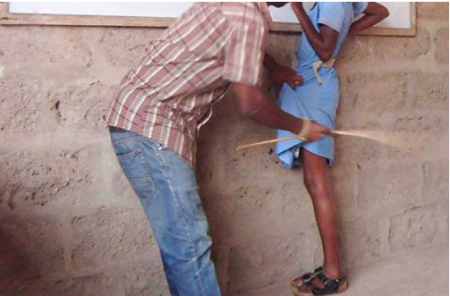Sis Martha Imhandiojie, Administrator, Eucharistic Heart of Jesus Model School (EHJMS), Kubwa, Abuja, on Wednesday condemned flogging of children as the main and only method of correcting and instilling discipline in them.
Imhandiojie, in an interview with the News Agency of Nigeria (NAN), urged school administrators, parents, guardians and teachers to find alternative and more effective ways of achieving this.
She said that resorting to excessive flogging of children would not only cause severe physical harm to them but render the method ineffective over time.
According to her, when you resort to flogging all the time and children get used to it, then flogging will no longer be an effective way of correcting them when they misbehave.
She said there were better and more effective ways of correcting children who did wrong without flogging them.
The proprietor condemned cases of child brutality in some schools across the country which had caused severe physical injuries to some of the children, adding that this should be prevented.
“There are many ways of correcting children effectively that does not necessarily require flogging them.
“Cases of child brutality in schools and even in some homes is something sensitive that should be handled appropriately. Parents and schools authorities should find alternative ways of correcting children.
“In our school here, we frown at child brutality or flogging; it is not encouraged for a teacher to beat a child let alone to the extent where the child sustains serious injuries.
“To prevent such from happening, teachers have been warned not to flog the students, rather I have instructed that if a child does something they think requires flogging, the child should be brought to me.
“We have had cases of parents coming to the school to fight teachers who have flogged their children and we have also had several requests from parents telling us that it is OK to flog their children if the case warrants it.
“In all these situations, we have tried to find a balance by discouraging the act of excessive flogging and found alternative ways of correction and instilling discipline in the children,” Imhandiojie said.
She said that other ways of correcting a child could be informing the child that he or she would be deprived of a basic desire or going ahead to deprive the child of that desire.
Imhandiojie said children always despised being denied something they loved, hence they would think twice about going back to a wrong act or behaviour.
“A teacher can tell the child that he or she will be brought before the school assembly and everyone informed about what he or she has done.
“Children hate being ridiculed before their peers; in fact, a child will prefer to be flogged than being subjected to that and so it will serve as a warning or lesson to the child to behave more appropriately and not repeat a wrong doing.
“A child can also be deprived of a desire like being prevented from playing with other children. Children hate being isolated or kept away from moving around; they become restless.
“All these are examples of methods that can be used to correct a child or instill some discipline without flogging them.
“I am not totally against flogging a child; sometimes this may be necessary but when a child is beaten to the extent where he or she sustains severe physical injuries then that is not acceptable.
“Alternative methods should rather be sought and encouraged.”
She urged secondary schools to introduce guidance counselors, as this would encourage the students to speak out about their problems for them to be properly guided and moulded into making the right decisions in the future.
She said that it would also teach the children to learn and realise the importance of speaking out and sharing their problems with others.
According to her, this will help to prevent and address other societal ills like child sexual molestation which is currently a major problem in the society today. (NAN)

